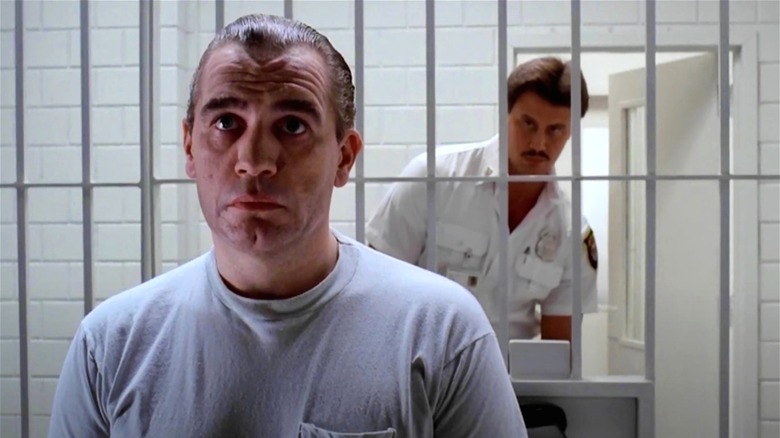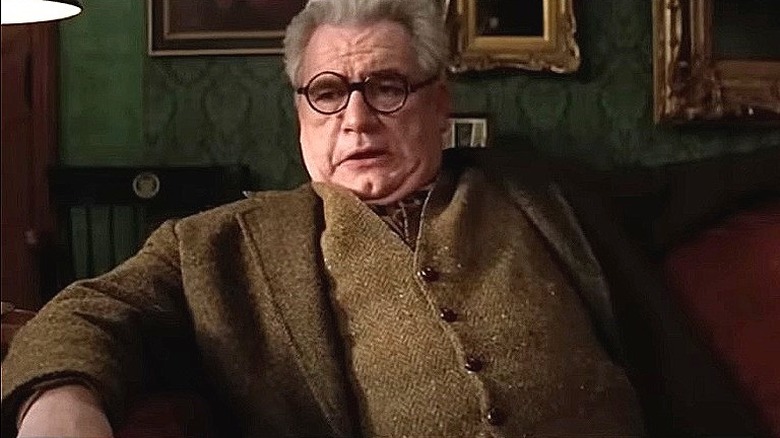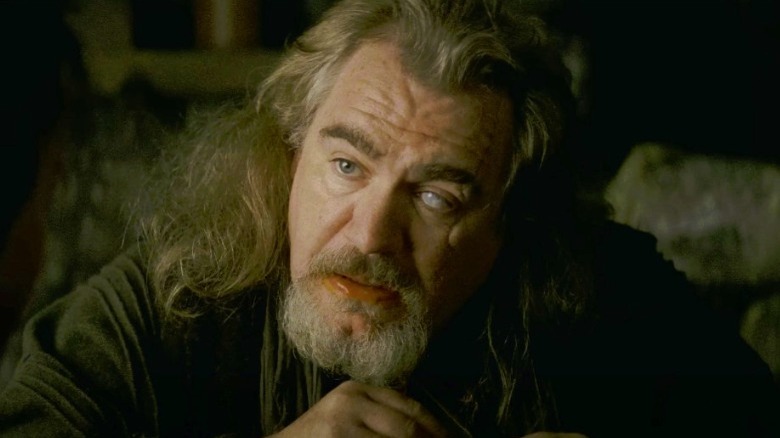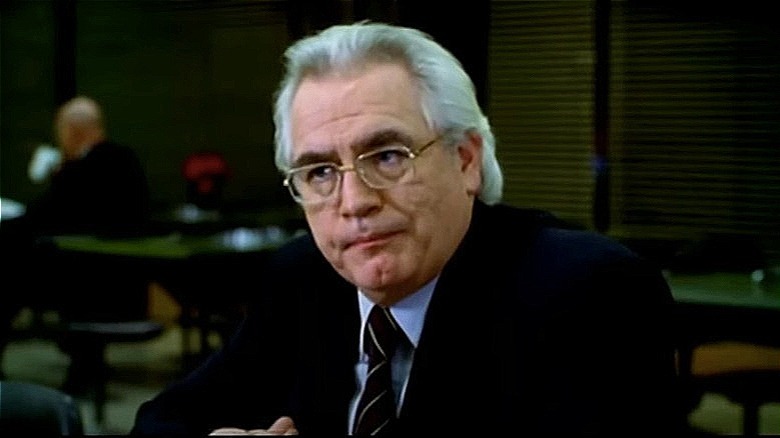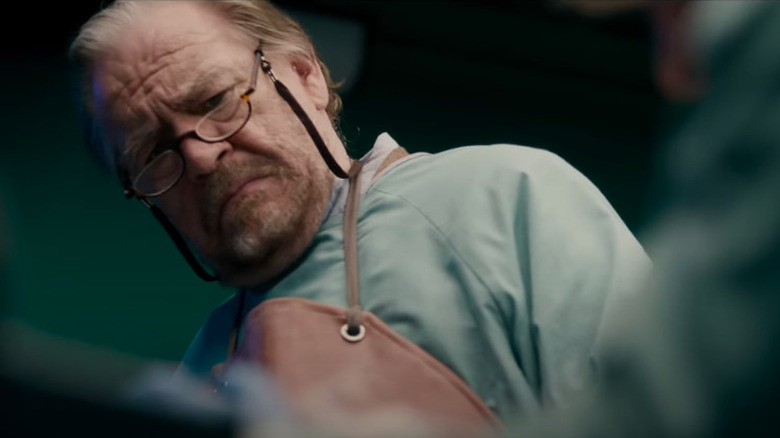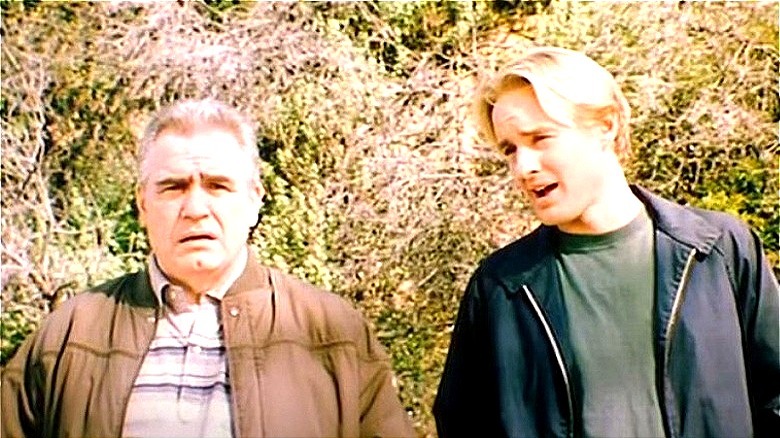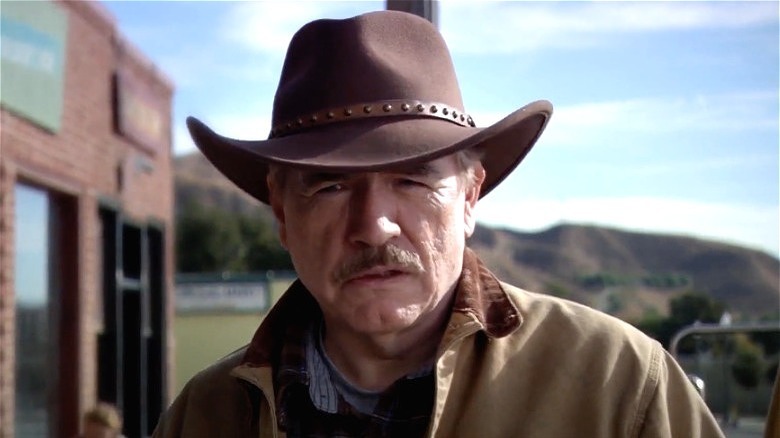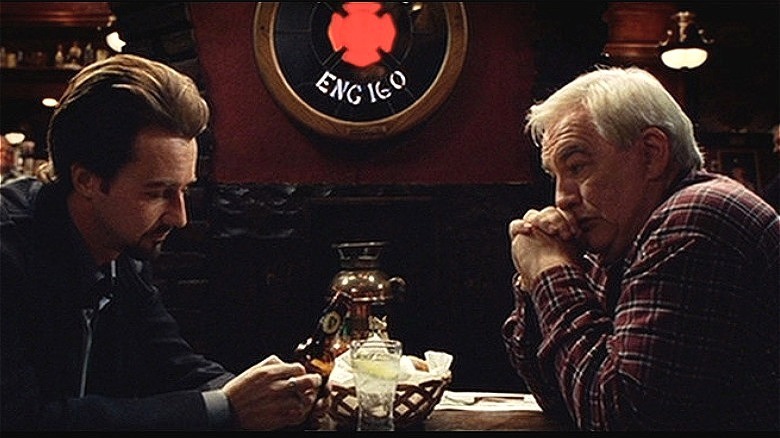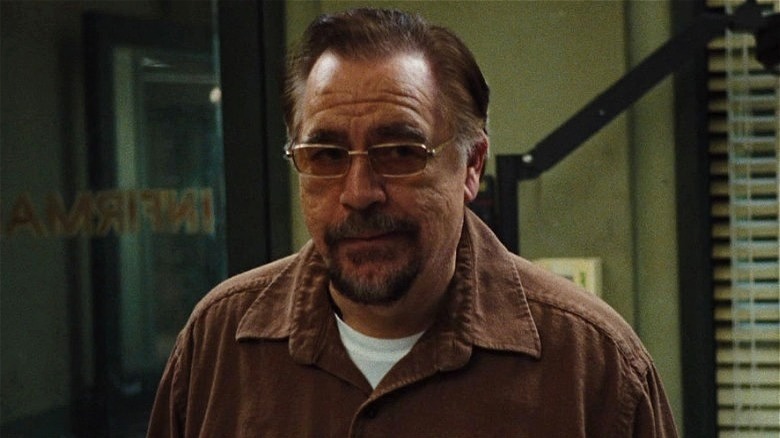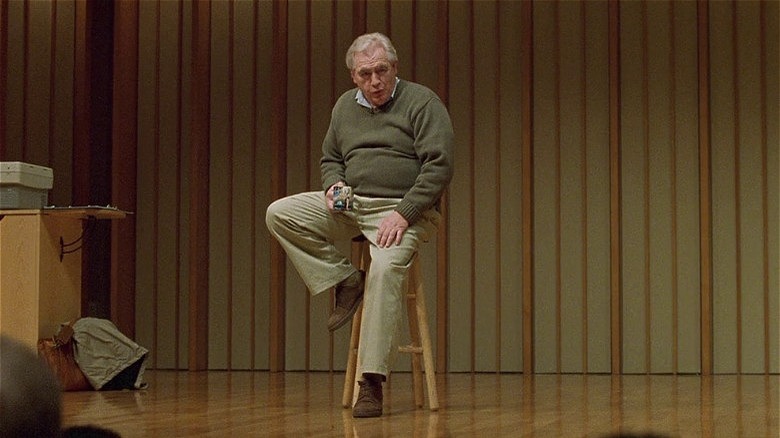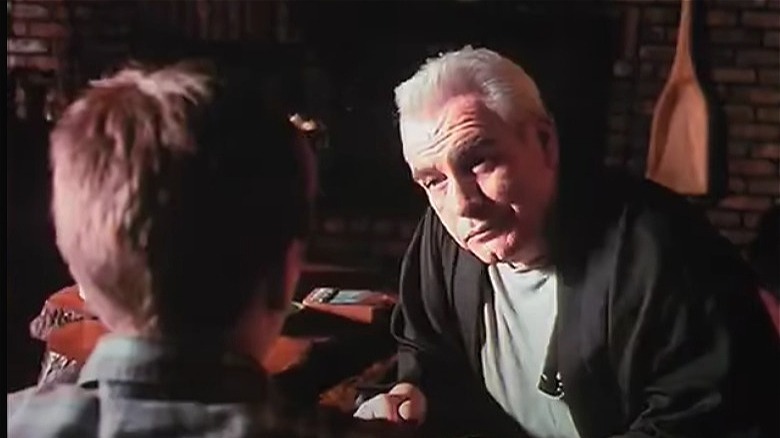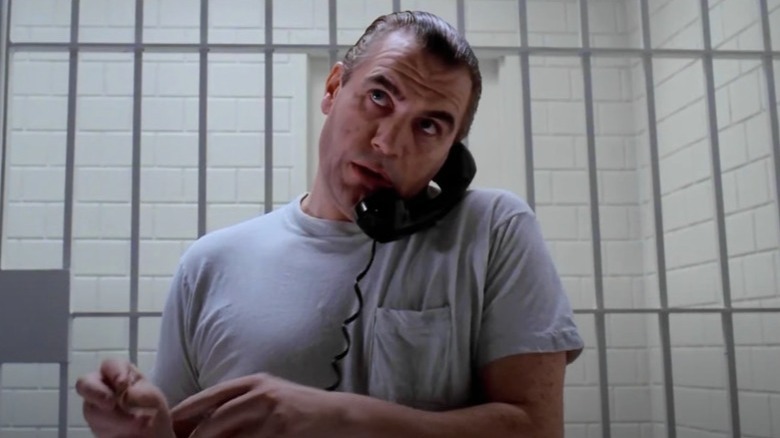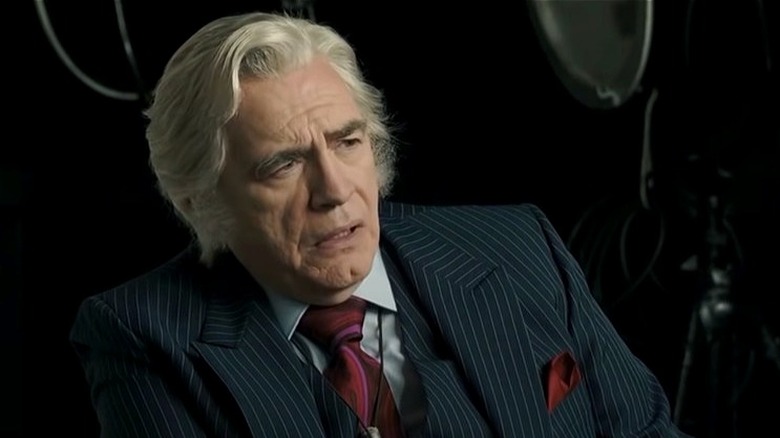12 Best Brian Cox Movies, Ranked
A generation may see Brian Cox only as Logan Roy, the patriarch of "Succession," but there's a lot more to the Scottish actor than HBO's hit black comedy. Cox is established not just in television but on stage and in film, where he's worked with directors such as Wes Anderson, David Fincher, Michael Mann, Spike Lee, and Spike Jonze.
Cox's venerable reign at the top of Hollywood's B-list — on his way to the A-list — has been truly workmanlike, encompassing some 240-plus acting credits (via IMDb). In 2001, Cox won an Emmy for his performance as Hermann Göring in the TV movie "Nuremberg." Two years later, Queen Elizabeth II appointed him Commander of the British Empire (something he now regrets, according to The Independent), and then, in 2007, the UK Film Council recognized Cox as among the top 10 most powerful British actors in Hollywood (via PBS).
With "Succession" now concluding its fourth and final season, Cox will have a great many scripts to choose from. But before you scan around for the Scotsman's upcoming projects, take a look at the films that made Cox one of the film industry's most respected supporting actors.
12. Rushmore (1998)
In "Rushmore," Wes Anderson's loosely autobiographical account of life at his Texas high school, Brian Cox gives a dry, quirky performance as headmaster Nelson Guggenheim, the foil to protagonist Max Fischer (Jason Schwartzman), an earnest and eccentric 11th grader.
Guggenheim sports round eyeglasses and an extensive tweed wardrobe and he pairs these with a blustering intellectualism that holds no prisoners. For instance, he assures young Fischer that he is on "sudden death academic probation" and that he will terminate his scholarship should his poor grades continue. Despite this grandiose threat, Fischer can't distract himself from first-grade teacher Rosemary Cross (Olivia Williams), the woman of his (inappropriate) dreams.
Cox harbors fond memories of his time working on "Rushmore," which he cites as his first big, creative American movie."I like working with new young directors," Cox told Vanity Fair, "There's a kind of clumsiness about them and that's okay. They can be a pain in the ass ... a lot of them are ... but sometimes they are quite exquisite. Wes Anderson was of the exquisite variety."
11. Braveheart (1995)
Mel Gibson's historical epic notoriously ignores the facts of William Wallace and his defense against the English, but "Braveheart" engages as a hack-and-slash yarn nonetheless. It marked Gibson's second film as director and the first to display his skill at staging action sequences. The filmmaker recreates the Battle of Stirling Bridge with an impactful medley of stabbing, slitting, and clubbing that sends blood and limbs flying in a frenzied reel of mid-shot photography.
Cox plays no part in that gory spectacle because he assumes the role of Argyle Wallace, William's fictional uncle. Argyle cares for a young William in 1280 following the death of his father Malcolm (another inaccuracy, according to The Scotsman), and he takes the future warrior through Europe, where he receives a general education that develops his leadership skills in time for the bloody conflicts against Edward I of England during late 1290s and early 1300s.
Gibson has been a controversial figure for some years now, but Cox offered only positive comments, describing him in a Vanity Fair interview as "one of the kindest, nicest, and most creative" persons he ever worked with.
10. The Bourne Identity (2002)
2002 remains a milestone in action genre history. First, Sam Raimi's "Spider-Man" spelled the beginning of the all-consuming superhero film at the expense of the previous decade's action-heavy, R-rated box office fare. Then came "The Bourne Identity," the film that infected the action genre with the shaky cam virus.
Inspired, perhaps, by the jarring camerawork of "Saving Private Ryan," "The Bourne Identity" uses the shaky technique to add a realist edge to its numerous action sequences, only it goes a step further than Spielberg's war epic by cutting about a dozen camera angles into each burst of action, resulting in a kind of scrambled flipbook animation effect. Don't take this as a total condemnation of "The Bourne Identity." Doug Liman's film is by no means the worst abuser of this aesthetic. I resent not so much the film's content but the long shadow of its precedent, which created countless imitations that upped the ante until the American action film hit rock bottom, which, of course, was the fence jump scene from "Taken 3." May we never return to such madness.
Anyway, the point here is Brian Cox — and he makes no contribution to the camerawork, of course. Instead, Cox assumes the role of CIA Deputy Director Ward Abbott, a shady, string-pulling operator. Cox plays him with typical restraint, opting for a kind of bland, corporate authority instead of the cartoonish evil found in the James Bond franchise, which would take inspiration from Jason Bourne in "Casino Royale."
9. The Autopsy of Jane Doe (2016)
All I'll say about the plot of "The Autopsy of Jane Doe" is that it begins as true crime and unravels into a 17th-century horror film. Your opinion of this will depend on your tolerance for the supernatural. Mine is rather low, so my view of the film dimmed by the final act, but the genre shift did not undo the creepy suspense that preceded it, and it didn't negate the leads' chemistry, either.
Cox gives a fatherly turn as Tommy Tilden, a coroner who runs a provincial office with his son Austin, played by Emile Hirsch. The actors achieve a familial warmth together and you believe in their passing-the-baton dynamic. This reflects not only the quality performances but also the simplicity of the script, which was written for the screen but could have easily been adapted from a stage play, owing to the small cast and confined setting.
Special props go to Olwen Kelly, who, as the titular Jane Doe, remains still for longer than perhaps any actress in the history of cinema. Her presence imbues the film with a much-needed unnerving element. Close-up shots linger on Jane's vacant, porcelain-white face, suggesting that it may reanimate at any moment. I won't comment on whether it does or not, but I can confirm that "The Autopsy of Jane Doe" has a few very effective jump scares waiting for you.
8. The Minus Man (1999)
"The Minus Man" casts Owen Wilson as Vann Siegert, a roving serial killer. Images of the mop-haired actor wielding a knife, axe, or other elaborate weapon may sound absurd, but that's not Vann's modus operandi. The 32-year-old murderer dislikes getting his hands dirty, so he uses a flask of liquor laced with a tree bark poison endemic to the Pacific Northwest. We don't know why Vann does this and neither does he. The man has almost no sexual drive and he takes little visible pleasure in deceiving people. He briefly references "helping" his victims, but it seems he kills simply because he can.
Wilson inhabits the killer with his usual easy demeanor, which instills trust in the characters around him, even Jane (Mercedes Ruehl), a prickly homeowner who, with endorsement from her husband Doug (Cox, in a sturdy supporting turn), offers Vann a room to rent in their suburban home. It doesn't take long for Vann to witness the picket-fence couple's strange dynamic. Unlike his wife, Doug is an open and excitable man whose moods turn quite volatile after a few drinks. He's not dangerous, though, certainly not compared to Vann, whose boyish mien belies a callous disregard for life.
We wait for answers but never find them, not even in Vann's passive narration, which muses on his crimes and how they affect those around him, including locals attending a church service for his latest victim. "I could say one single sentence and it would all stop," he observes, almost teasingly.
7. Red (2008)
In its first third or so, "Red" is a mature, well-developed revenge story. Cox stars as Avery, an older man who lives a reclusive country lifestyle but leans on the right side of cantankerous. He's agreeable, for instance, when three teenagers led by Danny (Noel Fisher) approach him and his dog Red at a fishing spot. Shotgun in hand, Danny asks Avery for money and when he receives only $30, he shoots Red, spits on him, and then walks off, laughing.
It's easy to invest in such vile injustice and our empathy is bolstered by the maturity of Stephen Susco's script (adapted from Jack Ketchum's novel of the same name). Instead of Second Amendment justice, Avery appeals to fairness and law, but these aren't so effective when you're dealing with Danny's father Michael (Tom Sizemore), a scuzzy millionaire redneck with the local D.A. in his pocket. What follows depicts the indignation, anxiety, and rage of bitter, real-life conflict. However, there wouldn't be much of a movie here if the story got resolved in a provincial state court; Avery's diplomacy turns into brinkmanship which ultimately descends into tit-for-tat, easy-to-predict violence.
Still, the characters and performances buoy "Red." Take Noel Fisher; I don't mean to insult him, but there is a malicious quality to the actor's face and he knows how to use it. Danny is an amoral demon child riddled with spite and inadequacy. Cox is more reserved, playing it steady but not without a growing anger that threatens to unravel.
6. 25th Hour (2002)
"25th Hour" doesn't offer much to the plot-oriented viewer because the synopsis outlines the entire three-act structure. You know that Monty Brogan (Edward Norton) is a drug dealer sentenced to seven years after a DEA drug bust. Bail has granted him temporary freedom — a freedom he could well exploit — but Spike Lee's film is hardly coil-sprung crime fare. Instead, "25th Hour" is two hours of character-driven purgatory, and I mean that as a compliment.
Cox gives a hardy supporting performance as Monty's father, James, an Irish-American firefighter turned bar owner. His appearances are fleeting through much of the film, taking a back seat to Monty, his girlfriend Naturelle (Rosario Dawson), and childhood friends Frank (Barry Pepper), a brash stock broker, and Jacob (Philip Seymour Hoffman), a neurotic English teacher. James has his time, though, and he throws a dangerous, fantasy-laden curveball into the film's otherwise linear narrative. "25th Hour" usually goes overlooked by Lee fans, but the performances pack a punch, and the scenes between Cox and Norton sizzle.
5. Rise of the Planet of the Apes (2011)
Tim Burton's remake of "Planet of the Apes" dealt the franchise a nasty body shot back in the summer of 2001. The Detroit Free Press called it "just another summer title in a monkey suit," which was a view shared by a majority of critics and audiences, causing 20th Century Fox to axe their planned sequel despite the robust box office numbers (via Box Office Mojo).
Happily, Fox came back 10 years later with "Rise of the Planet of the Apes" and gave the franchise the reboot it deserved. It was (and still is) an engrossing origin story with spectacular visual effects, meaningful commentary, and a set of strong performances by John Lithgow, Cox, and a motion-captured Andy Serkis as Caesar the chimpanzee.
Dr. William Rodman (James Franco) raises Caesar from birth and nourishes his hyperintelligence, enhancing it with a drug called ALZ-112. Despite this, Caesar's place in the Rodman home becomes untenable after a physical misunderstanding involving Rodman's father Charles (Lithgow), who suffers from Alzheimer's. Consequently, Caesar is detained by John Landon (Cox), manager of the San Bruno Primate Center.
Cox plays Landon as a gruff figure with little interest in the animals beyond controlling them, but the old man is way preferable to his son Dodge (Tom Felton), whose wanton sadism inspires Caesar to plot an escape. It's the springboard moment in a compelling reboot that harks back to the original film's sweeping popularity.
4. Adaptation (2002)
Spike Jonze's "Adaptation" isn't as preposterous as "Being John Malkovich" — the director's first collaboration with screenwriter Charlie Kaufman — but it is still a thoroughly off-beat production with an acidic metafictional quality.
Nicolas Cage stars as a fictionalized version of Kaufman who, during the production of "Malkovich," falls into a pit of intense neuroticism and writer's block as he attempts to adapt "The Orchid Thief." That much is broadly true; Kaufman did indeed struggle with Susan Orlean's non-fiction bestseller. But don't take "Adaptation" as biography, though. The majority of it is either exaggerated or outright fictionalized, most notably the presence of Kaufman's twin brother Donald (also played by Cage).
Closer to the truth, perhaps, is Cox's performance as Robert McKee, a real-life screenwriting lecturer known for his sweary, aggressive manner. Cox makes good use of his powerful Scottish lungs, bellowing McKee's didactic teachings in a manner that rings true to McKee's critics, such as the British filmmaker Chris Morris, who described the lecturer as a bully and a purveyor of "f***ing snake oil" during an interview with The Adam Buxton Podcast.
3. L.I.E (2001)
Like "Kids," "Gummo," and "Thirteen," Michael Cuesta's "L.I.E" is a transgressive film about Y2K youth finding themselves with sex, drugs, violence, and general delinquency. But what separates "L.I.E" from its peers is the character of "Big" John Harrigan (Cox), a former marine and committed pedophile.
We meet Big John through Howie (Paul Dano) and Gary (Billy Kay). These 15-year-old kids live near the Long Island Expressway — the acronym which lends the film its title — and they have a habit of burglarizing expensive suburban homes. One such home belongs to Big John, and they arrive there not by chance but through a disturbing relationship between Gary and the gregarious veteran. We don't know what kind of home Gary comes from, but he is a hypersexualized adolescent who, according to John, has been sexually active with numerous local men, himself included. John met Gary and many like him at a layby off the L.I.E., luring them to his car with nothing more than a few dollar bills. You expect John to do the same with Howie when he corners the boy about the burglary, but he doesn't. He sees something beyond sexual exploitation in him, and that's where the film's queasy brinkmanship begins.
"L.I.E" brings nuance to one of society's last unmitigated taboos and Cox meets this challenge with a brilliant performance that is at once charming, articulate, and yet completely abnormal.
If you or someone you know may be the victim of child abuse, please contact the Childhelp National Child Abuse Hotline at 1-800-4-A-Child (1-800-422-4453) or contact their live chat services.
2. Manhunter (1986)
For many, the character of Hannibal Lecter begins and ends with Anthony Hopkins. Mads Mikkeslen's performance has its fans, true, and some may even appreciate the late Gaspard Ulliel's work in "Hannibal Rising," but if one is to look beyond Hopkins then there is only one direction to look in, and that is back to 1986's "Manhunter" starring William Petersen, Dennis Farina, and, in the role of Lecktor — yes, that was the character's name — an ice-cold Cox.
Cox presents a very different interpretation of the cannibal serial killer. Whereas Hopkins went theatrical, Cox goes low-key. He plays the role with a menace that's understated yet every bit as committed to games of the mind and, when he can, games of the flesh. "The Silence of the Lambs" afforded Hopkins barely 15 minutes of screen time. Cox got nary a second over five minutes in "Manhunter." After the patrician villainy of "Succession," I wonder if we are ready for a feature-length depiction of Cox's Hannibal Lecktor?
1. Zodiac (2007)
What is the greatest year for cinema in the 21st century to date? Well, "No Country For Old Men," "There Will Be Blood," "The Diving Bell and the Butterfly," and "Eastern Promises" all opened in 2007, and so did "Zodiac," David Fincher's exquisite true crime mystery thriller. Rich in character and period detail, the film engrosses you in the creepy milieu of the Zodiac killer, who murdered at least five people across northern California in the late 1960s.
Cox appears as Melvin Belli, a noted lawyer who defended many celebrities throughout his career. Belli encountered the Zodiac case in 1969 when a man claiming to be the killer asked to speak with him via a televised phone call on Jim Dunbar's "A.M. San Francisco." Fincher recreates the original broadcast down to the decor, the outfits, and even the placement of a mug. Cox is thorough, too, adopting Belli's mannerisms, including a right-leaning posture as he tilts into the desk and attempts to reason with the disturbed, anonymous voice.
Cox does not stand out in his role but neither does Jake Gyllenhaal, Robert Downey Jr., or Mark Ruffalo, because "Zodiac" is a true ensemble effort and fully deserving of its ever-growing reputation. This is not the best performance of Cox's career (though it's terrific), but it is, I think, the actor's best film.
